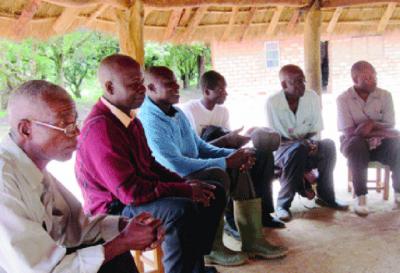Education
The NGO is focusing on men as key agents of change by setting up groups where men can encourage other men to change their behavioural patterns as far as domestic violence is concerned. Cultural attitudes that assume male superiority are considered a key factor in violence against women.
In a recent interview with The Zimbabwean the chairman, Morris Bvumbe, said recent studies indicated that 85 percent of gender based violence in Zimbabwe was done by men towards women and girls.
"But we should not just point a finger at men as being the problem. There are many men of good will who don't abuse women. So we thought why don't we take advantage of some of men who are good ambassadors and work with them to transform their fellow men," he explained.
Husband School
Bvumbe said one of his group's core activities is known as Husband School, where young and old men are taught how to become responsible fathers and how they to take care of a family.
"This is drawn from women's groupings like in bridal showers, kitchen top-ups and wardrobe top-ups where they share family practices. But yet when a young man is going into marriage, he is not told anything," explained Bvumbe.
"What it means is that many young men have gone into marriage without knowing what to do in there, what is expected of them, how they should behave and so on," he said. His group now has some 200 men across Buhera district and interest is spreading fast.
William Tsomondo, who chairs the Gaza Men's group that is part of MGE, said they also worked to address a number of other issues previously regarded as being the female domain.
How many children?
"We have issues like the role of men in HIV prevention, child-rearing and men's responsibilities in the reproductive rights of women," he explained. "On this we are saying: what is the role of men in deciding how many children a women would have in a family? Cultural norms handed down through generations in Zimbabwean mean that even today many women have no say in their families. We need to foster a level of empowerment where they can negotiate how many children they should have. Otherwise we will continue to have men bring so many children into this world, even when they know they can't take care of them," Tsomondo noted.
Bvumbe said despite legal action, the problems of domestic violence persisted and that is why MGE decided to take a new approach to try and deal with the issue. "For us we have seen that this is a very important section, because sometimes when we use women's groups to discuss the issue or to come up with solutions, people think that we are being biased," he said. "But when men are seeing their fellowmen doing the activities, they feel encouraged and think that this is a real case for them to change behaviour."
A changed person
Joseph Muranganwa, who has been attending the Husband School, said he was now a changed person. "I have seen some changes in my attitude towards my wife and children. I am now a changed person and I now understand the importance of building good family relations," he said.
Another participant, Peter Makina, said he was now fully devoted to his family. "My family is now sticking together. After attending the gender meetings I have realized that as a family we now stand by each other during times of trouble. I have gained loyalty from my wife and children," he said.
Women in the community said the initiative was making a real difference in their lives. Clara Mambodza, a villager from Gaza, said her husband was a different man since he attended one of the meetings organized by the MGE.
Responsible father
"In the past he used to beat me up for no valid reason. But that does not happen anymore," Mambodza explained. "He would beat me for coming late from the market even in the presence of my friends. But when he attended one of the meetings organized by the grouping there is indeed a change," she said.
Anna Kagum,a another villager, said: "The meetings have indeed changed marital relations in my household. We are now a good family and my husband has completely changed. He used to beat me up for no reason when he was drunk. He would squander his salary on beer, but, after he attended the meetings he has become a responsible father."
A similar initiative is being implemented in other districts in Manicaland province including Nyanga, Chipinge, and Chimanimani.

